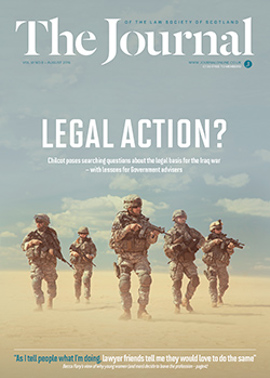Mr v Mrs: the real mediation world?
Mr v Mrs is a BBC2 documentary aired on 21, 28 June and 5 July 2016. National Family Mediation in England & Wales opened its doors to a fly on the wall documentary following a variety of couples participating in family mediation. The documentary is certainly of great interest to family lawyers and mediators generally in Scotland, albeit that the context in England & Wales is quite different to the Scottish context: in England & Wales attendance at a mediation information and assessment meeting is now mandatory prior to litigation.
The programme itself attempts to lighten the heavy content by having Zoe Wanamaker provide a jaunty voiceover, and cutting to romantic scenes with cheesy pop music playing over the top. The attempt fails to make it anything other than fairly depressing viewing.
However, as an exercise in public education, does the programme succeed? Certainly, no member of the public watching the documentary will ever confuse mediation for separated couples with couple counselling (a frequent barrier to mediation participation), so even insofar as it achieves that, the programme is a success. The mediators themselves are, on the whole, very impressive and their explanations of the mediation process are clear and helpful (by voiceover and in the room with clients).
For a particular client contemplating mediation, the programme might be less helpful. The couples followed by the cameras are inevitably a self-selecting group who are not necessarily a representative sample of mediating couples. That dynamic is exacerbated by the editors succumbing to temptation to show the highest drama moments, rather than the moments of significant breakthrough. NFM claims a resolution rate of 75-80% of its cases, a statistic not borne out by the cases shown in the programme.
From a mediator’s perspective there was some frustration. There were a few of the couples who did achieve substantive progress, but the mediator interventions that achieved that progress were not televised. It would have been instructive to see what happened that helped those couples to move forward so dramatically. It was also personally frustrating to watch non-lawyer mediators struggle to mediate financial disputes where a lawyer mediator could have provided information about the law that might very well have helped to get the clients past their impasse.
That said, the programme ended on a high note, perfectly representative of the huge difference that mediation can make: an apparently intractable international child relocation case was resolved, with the child and both parents shown to be thriving months down the line. At least one of the parents credited the mediation process with making all the difference for their family. That’s the message that family mediators would like the public to receive.
In this issue
- Human rights: preparing the UK's report card
- Doping and Rio – the final say?
- Mr v Mrs: the real mediation world?
- GDPR – still coming to the UK
- eDisclosure and Brexit: GDPR come what may?
- Tom Axford, 7 March 1960-12 May 2016
- Reading for pleasure
- Opinion: Billie Kirkham
- Book reviews
- Profile
- President's column
- Pilots chart a course
- People on the move
- Thiepval: what does that mean to you?
- Iraq: a basis in law?
- Big Brother, or benign assistance?
- Activist banking
- Hostility enacted – a view from practitioners
- Bankruptcy reconstructed
- No-blame redress: a blueprint?
- Moorov: bridging the gap
- Ten years of cohabitation claims
- Employment law post-Brexit: what change is likely?
- Mine, and they're private
- Brexit: is parting sweet or sorrow for pensions?
- Scottish Solicitors' Discipline Tribunal
- Brexit? Don't panic...
- Law for heroes
- Law reform roundup
- Vulnerable witnesses: LJC alert
- Power to whose elbow?
- It isn't about the babies!
- Covered by the terms?
- Ask Ash
- The power of culture
- Properly engaged
- Paralegal pointers






